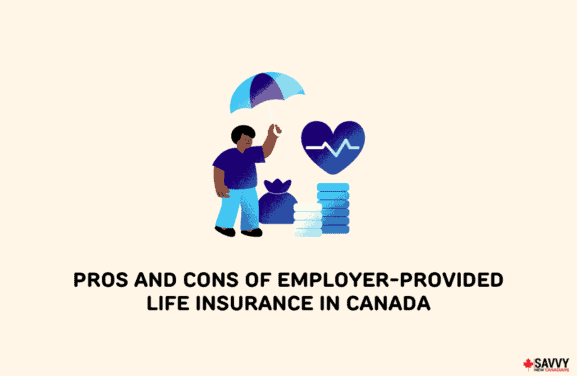Group life insurance provides insurance coverage for the lives of individuals who are part of the same workplace or organization. This term life financial product is often offered at reduced rates or even free or as part of Canadian employee benefits.
This article covers everything you need to know about group life insurance in Canada, including how it works, its benefits, and a comparison to personal life insurance.
Key Takeaways
- Group life insurance plans provide insurance coverage for individuals part of a specific group, which is often a workforce.
- Both employees and their dependents can be covered by group life insurance.
- Group life insurance plans typically end on your last day of employment.
What is Group Life Insurance?
Group life insurance is a term life financial product that’s included in a group contract. Just like individual life insurance, this insurance type protects individuals and families against financial burdens in the event of death.
The main difference, though, is that group life insurance is often cheaper and is only in effect for a set period of time.
Group life insurance has various types that differ in the number and extent of benefits included. Since it’s typically offered by employers, they are the ones who also make the choice of what type you receive and how much you have to pay, if necessary.
Keep in mind that most group insurance contracts end on the last day of your employment if the insurance is part of your employee benefits. Hence, relying solely on a group life insurance plan is not recommended, as it won’t be available once you change careers or retire.
Types of Group Life Insurance
Group life insurance is typically divided into four types. Two of these types offer protection only for the individual or employee who is part of the group, while the other two types protect their dependents.
Let’s dive into the specifics of these insurance policies below.
Employee Basic Life
In the event that a group life insurance member passes away, the employee’s basic life package will pay the dependents a pre-specified amount of money. How much the insurance payout would often depend on the employee’s salary and is revised yearly based on how much you or your employer pays as premiums.
Employee Optional Life
The employee optional life gives employees the option to add more policies on top of what the basic life package offers. In return, employees are required to pay the extra fees incurred by the policy additions on their own.
Dependent Basic Life
Similar to the employee’s basic life, the dependent basic life pays a pre-specified amount in the event of death. However, in this case, the insured individual is not the employee. Instead, it’s the employee’s dependent, which can be their spouse, child, or other family members.
Dependent Optional Life
The dependent optional life can be considered an upgraded version of the dependent basic life insurance. This insurance type lets employers add new policies for an added cost, allowing them to get more coverage if one of their loved ones passes.
How Does Group Life Insurance Work?
Group life insurance works similarly to other types of insurance. The insurance company charges a monthly premium while you’re under the contract so that, in the event of an unfortunate passing, the dependents of the covered individual can receive the promised monetary benefits.
Keep in mind that many employers shoulder the premium costs on your behalf. However, some employers deduct the insurance costs directly from your salary. So, ensure that you double-check how the insurance payment will work for your specific group life insurance plan.
PolicyMe

Affordable life insurance in Canada
Apply online in 20 minutes
Child coverage at no extra cost
Critical illness insurance coverage for 44 conditions
Group Life Insurance Vs Regular Life Insurance
Both group life insurance and regular or individual life insurance provide monetary benefits in the event of an insured individual’s death. However, there are several differences between these two insurance types.
Terms Of The Contract
In an individual life insurance plan, you’ll have a direct contract with the insurance company. This means you will greatly influence the policies you’d like to be added, modified, or changed.
On the other hand, when under group life insurance, you’re only part of a group contract that your employer most likely initiates.
Payment Or Premium Rates
Your premium rate, or monthly payment, can’t be changed after an agreement has been made in individual life insurance. However, under employer-provided life insurance, the insurance-issuing company may change the monthly premiums based on the claims record of the entire group.
Insurance Cancellation
Only you can cancel your insurance plan if you have individual life insurance. However, when it comes to group life insurance for employees, the insurance provider can cancel the group contract at any time.
Contract Duration
How long you’re covered by regular insurance will depend on how long you’re willing to pay the premiums. As long as you pay on time, you’ll still be covered by individual life insurance, regardless of whether you lose your job or switch careers.
The group life insurance eligibility requirements, though, state that your insurance coverage can be terminated once you leave the workplace or organization that provides you access to the group life insurance.
Group Life Insurance Payout
The group life insurance payout is typically based on a member’s salary. For example, in the event of death, beneficiaries can receive a one-year salary worth of their loved one who passes or twice the amount, depending on the specific policy.
Group Life Insurance Eligibility Requirements
The eligibility requirements of group life insurance plans vary depending on your employer. However, many employers who offer this insurance plan typically only require you to be a full-time employee in order to be eligible for this package.
Age and pre-existing health conditions can be factors that affect whether insurance companies accept your application or not. After all, older employees and those with underlying health problems are at a higher risk of death.
Group Life Insurance Benefits
Here are some of the biggest benefits of getting or having group life insurance:
- It’s more affordable than individual life insurance and is even offered free by other employers.
- Since employers finalize contracts on employees’ behalf, insurance companies won’t be able to reject offering insurance to individuals based on their health conditions.
- The dependents of employees can also be covered by group life insurance.
Group Life Insurance Disadvantages
These are some disadvantages that group life insurance will typically have.
- You’ll only be insured when you’re part of the workforce.
- It’s usually harder to customize group insurance plans compared to individual types.
- The payout is generally smaller than what individual life insurance plans usually offer.
Is Group Life Insurance Worth It?
Yes, it’s worth it, as the group life insurance benefits greatly outweigh the cons. This insurance plan is one of your cheapest options, and often, your employer will cover most, if not all, of the premium you have to pay.
Just keep in mind that group life insurance is only reliable if you’re not planning to change jobs in the near future. That’s because this insurance plan will be automatically terminated on your last day of work.
FAQs
Group life insurance is a type of life insurance that’s provided to members of certain groups. It often has cheaper monthly payments and less strict requirements.
The premium of group life insurance is typically paid for by your employer. That said, some employees may be required to pay a portion of the premium needed.
Yes, you can get life insurance through your employer, provided that it has access to a group life insurance plan. Your employer often pays for or reduces the amount you have to pay monthly for the insurance.
Only you can decide whether your insurance coverage is enough or not. However, at the very least, your insurance coverage payout should be equivalent to one or twice your annual income.
Related:



